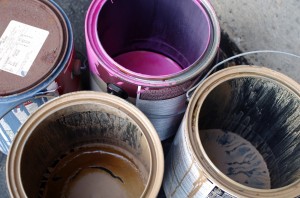
1. Lawn equipment
Lawn mowers, leaf blowers, snowblowers, weed eaters, and other lawn equipment can live new lives even after we think we’ve taken all they can give. There are several ways to recycle these, including donating them to a charity that can use them for basic upkeep of their properties. Mechanics can also find gold mines of usable parts even in broken machines. If the machine is truly deceased, try selling it for scrap metal.
2. Cords
Computer cables, jumper cables, extension cords, and other cords and cables are prime candidates for recycling. Check with your local recyclers or sell them for scrap metal (when applicable). If the cord still works, consider donating it to a thrift shop that will sell it to someone who could use the spare part.
3. Motor oil
According to the U.S. Environmental Protection Agency, motor oil never wears out, it just gets dirty. Most mechanics already take part in oil recycling, so if you have your oil changed professionally, you needn’t worry about this; however, if you DIY, be sure to take the used oil to a nearby auto maintenance or parts shop that participates in a recycling program.
4. Electronics
Do you have a junk drawer filled with old remote controls, cellphones, and other junk electronics? Most schools participate in recycling programs and get credits for donations of these items toward school computers, gym equipment, and other necessities. You can also contact your local recycler or public works department about other drop spots for these items.
5. Sports equipment
Is your garage filled with footballs, basketballs, bats, gloves, and gym equipment you no longer use? Your local YMCA, after-school programs, day cares, and schools could all benefit. Damaged treadmills and exercise bikes are excellent candidates for scrap metal. Companies such as reBounces take used tennis balls and recycle them for you.
6. Tools
You’ll likely think nothing of tossing out an old hammer or screwdriver, but this trash is treasure for Habitat for Humanity and other organizations that build playgrounds, homes, dog parks, and other public services. Discard old, nonworking power tools with a local appliance recycler.
7. Paint
It pays to keep toxic paint out of landfills. Most domestic waste management facilities can properly recycle paints, so check with your service provider. When submitting these materials for recycling, keep latex and oil-based paints separate.
Repurposing
Many household items can serve useful purposes in another capacity when their original one expires. Old paper towel holders are ideal for keeping track of tape and twine. Most any container makes a suitable planter, and old crates make great playhouses for kids or pets. Before tossing something out, think of how you, a local charity, or someone you know could benefit.
Recycling doesn’t just keep misdirected junk out of landfills. The practice also reduces the need to manufacture new items, which lowers energy consumption, reduces pollution, and saves limited reserves of our natural resources.